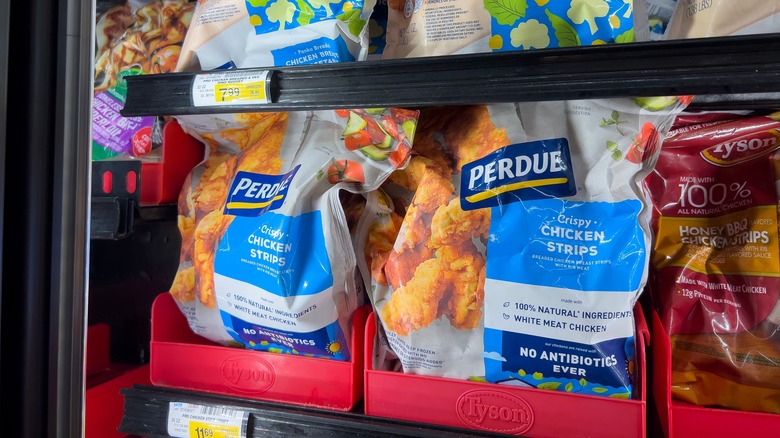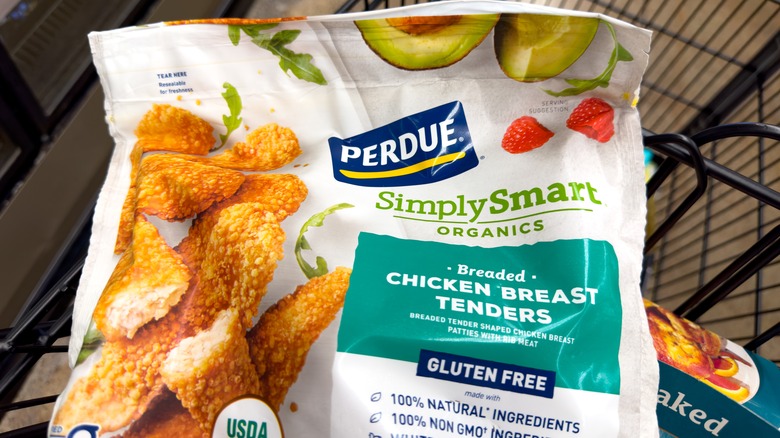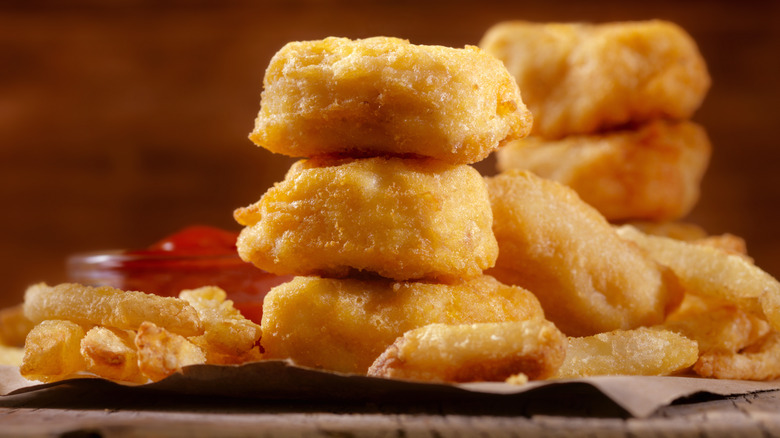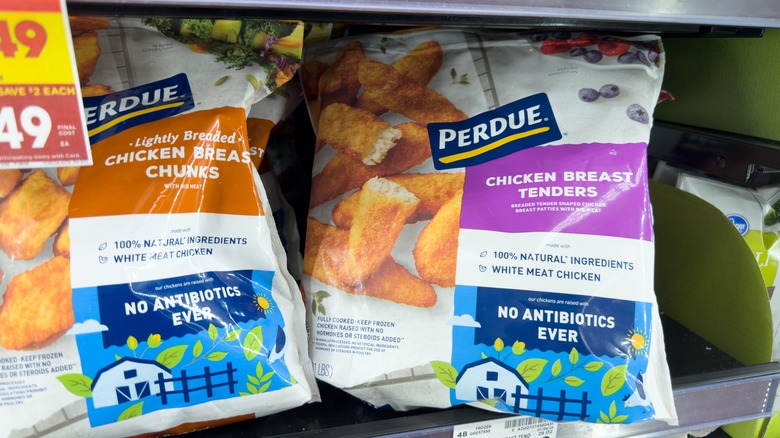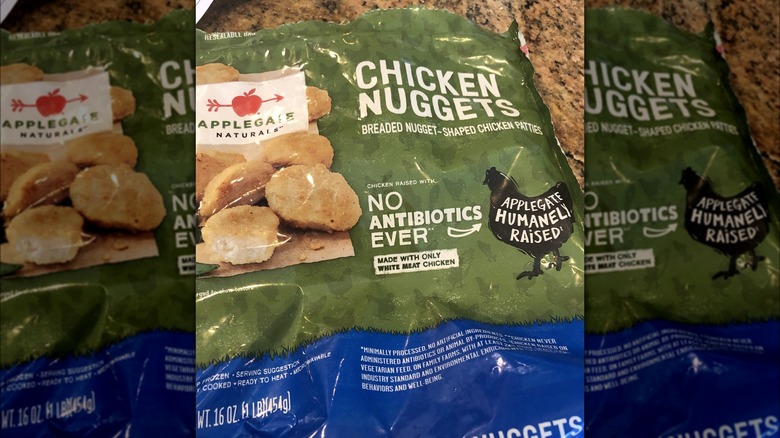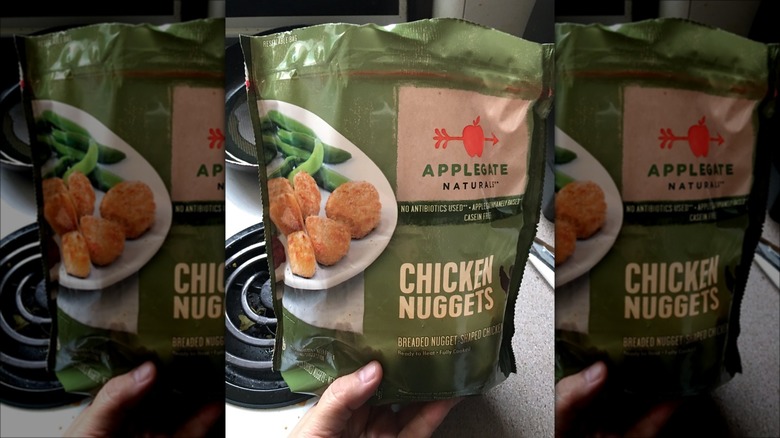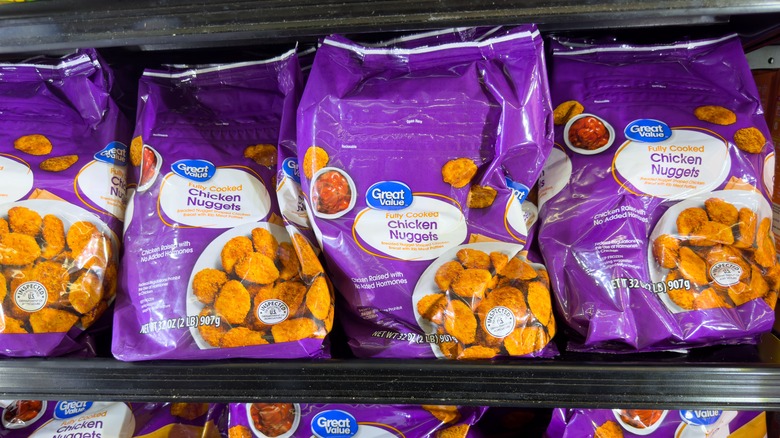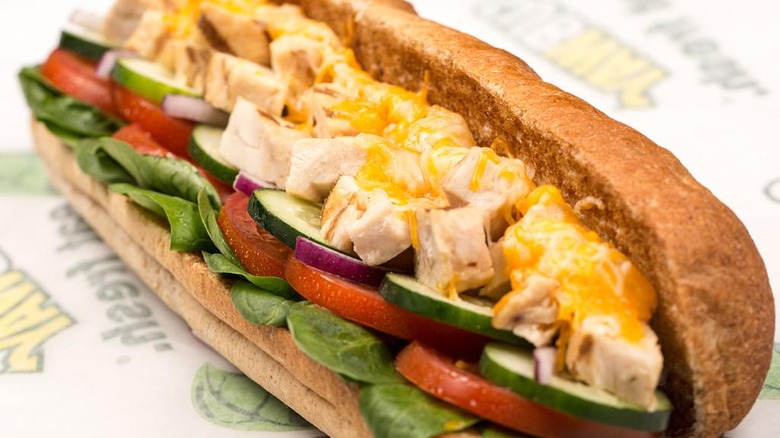The Biggest Recalls In Perdue Foods History
Frustrating though they may be, food recalls are tough to avoid. There are so many people and steps involved during the production and packaging processes that it's near impossible to prevent any negative side effects 100% of the time. That's why your local grocery store always seems to be warning customers about one food or another — and why the next headline about thousands of products being pulled from shelves nationwide is never too far away.
These recalls can happen for all kinds of reasons, some of which are far more serious than others. Perdue Foods has experienced the whole spectrum. Specializing in the likes of chicken, pork, lamb, and beef, the company was first founded as a chicken farm in 1920. Over a century later, it's faced obstacles such as inaccurate allergens, contamination, and even foreign objects winding their way into your meat. The worst of these incidents have impacted thousands of pounds of products, with customers nationwide encouraged to scour through their freezers to ditch affected purchases ASAP. Read on to discover the most significant recalls that have hit Perdue Foods over the years.
167,000 pounds of chicken nuggets and tenders (2024)
Sad though it may be, it's a universally acknowledged truth that some chicken nuggets contain much more than just "chicken." One thing you don't consider being thrown into the mix, however, is metal. In August 2024, this was the trigger point for one of Perdue Foods' biggest recalls to date. After receiving customer complaints, Perdue Foods recalled 167,171 pounds of chicken from stores nationwide. This included Simply Smart Organics Breaded Chicken Breast Nuggets, Butcherbox Organic Chicken Breast Nuggets, and Perdue Chicken Breast Tenders, the latter of which we once claimed tasted "like neglect and disappointment" in our ranking of frozen chicken tenders.
But, hey, better neglect and disappointment than metal. The metal in question was described as wire, which was found embedded in the nuggets. As per Jeff Shaw, Senior Vice President of Food Safety and Quality for Perdue, this was "a very thin strand of metal wire that was inadvertently introduced into the manufacturing process." While fortunately nobody was injured as a result of said wire, the USDA's Food Safety and Inspection Service (FSIS) still classified the recall as a Class I, which means it posed a "high or medium risk" that could potentially "cause serious, adverse health consequences or death." To minimize this risk, customers were urged to double-check their freezers for the nuggets or tenders — some of which were sold online — and throw them away, stat.
Gluten-free chicken tenders (2022)
The gluten-free variety of Perdue Chicken Breast Tenders may have been true to their word and did not contain any actual gluten in August 2022, but some did contain small pieces of plastic and blue dye. BJ's Wholesale Club — the East Coast warehouse club whose stores had exclusively received shipments of the affected products — alerted Perdue to the issue after a customer filed a complaint, claiming they had found both components within a single chicken tender.
No stores stocked the affected batches at the time, which meant that Perdue didn't need to carry out a formal mass recall. Instead, the FSIS issued a public health alert and requested that those who still had the products (which featured an establishment number of "P-33944" on the label and a "best if used by" date of July 12, 2023) throw them away or return them as soon as possible. Nobody reported any cases of illness after eating the chicken, but considering the fact that consuming plastic poses a choking hazard and can expose you to potentially dangerous chemicals – especially when exposed to high temperatures – we're not surprised that the FSIS encouraged people to get rid.
31,000 pounds of multiple varieties of chicken (2019)
Unexpected objects made another appearance in Perdue chicken back in May 2019. Approximately 31,703 pounds of ready-to-eat chicken products were recalled after both Perdue and the FSIS received complaints of customers finding pieces of "bone material" in Simply Smart Organics Breaded Gluten-Free Chicken Tenders, Whole Grain Chicken Nuggets, and Whole Grain Chicken Strips, plus Chef Quik Breaded Chicken Tenders and Chicken Breast Strips. That's a whole lot of chicken.
While these products had already been shipped nationwide, they were fortunately no longer stocked in stores. Instead, the main concern was that people may have already stashed the chicken in their freezer without realizing. Anyone who did find any of the affected products at home was told to either throw them away or return them to their point of purchase. While the odds of every single product containing this bone material were slim, Jeff Shaw, Perdue's Vice President of Food Safety and Quality, stressed that they were just pulling everything made in the same production run "out of an abundance of caution."
68,200 pounds of organic chicken nuggets (2019)
Of all the materials to contaminate chicken, wood is probably one of the most unexpected. And yet, in January 2019, wood was the motivation behind a major recall of 68,244 pounds (equal to roughly 49,632 bags) of Simply Smart Organics Breaded Chicken Breast Nuggets after three people complained about finding it in their food.
Again, as is usually the case with any food that may contain a contaminant that could cause serious damage if consumed, this was categorized as a Class I recall by the FSIS. No reported injuries were linked to the nuggets, which Perdue explained had been contaminated in what it believed to be an isolated incident that only affected a handful of the products recalled. However, considering how tough it would be to accurately separate the wood-free nuggets from the contaminated nuggets, better safe than sorry.
16,011 pounds of fun shapes chicken nuggets (2019)
Another big recall hit Perdue in January 2019 when the brand's Fun Shapes Chicken Breast Nuggets turned out to be not so fun. Contamination wasn't the issue this time around, and nor was the actual meat. Instead, it was found that the nuggets (which were shaped like dinosaurs, in case you were wondering just how fun a shape can be) were packaged with the wrong back panel label, meaning they didn't feature an accurate ingredient list.
This may not have been so major if the ingredients list on the back didn't miss out one major allergen: milk. Having noticed the inconsistencies between the back label of the packaging and the nuggets themselves, a grocery store raised the alarm to Perdue, which then conducted an in-depth investigation. Having isolated the issue to a specific production timeframe, the brand decided to recall all 16,011 pounds — or 21,348 packages — of the Fun Shapes Chicken Breast Nuggets with an expiry date of March 11, 2019, from 14 states. While there were no confirmed reports of someone falling ill from the Fun Shapes Chicken Breast Nuggets, the impact this could've had on just one person with a dairy allergy or sensitivity who accidentally consumed the nuggets makes it more than worth the effort of a recall.
495 pounds of chicken tenders (2019)
While it's not quite as gargantuan as some of the other recalls on the list, 495 pounds of chicken tenders still caused quite the headache for Perdue in September 2019 when the brand realized that its packaging was missing one key allergen: wheat. As per a statement released by Perdue Foods, it had accidentally packaged Simply Smart Organics Gluten Free Breaded Chicken Breast Tenders with a label that boasted an inaccurate ingredient statement that omitted wheat as an allergen.
Of course, for those with an intolerance or celiac disease, accidentally consuming gluten (of which wheat is extremely rich) is no joke. Perdue was quick to jump into action after a consumer inquiry into the packaging issue, figuring out the exact time that the affected frozen products were produced. It subsequently pulled all Simply Smart Organics Gluten Free Breaded Chicken Breast Tenders — which had been shipped out to grocery stores in Florida, Georgia, North Carolina, Ohio, and Pennsylvania — with a sell-by date of August 29, 2020, and encouraged those who'd already purchased the tenders to call for a refund.
2,148 pounds of organic chicken sausages (2017)
In May 2017, Perdue Foods was contacted by three consumers who all had the same problem. Their newly-bought Perdue Harvestland Italian Style Organic Chicken Sausages contained more than the advertised cage-free chicken. Instead, they discovered a colorful bonus ingredient: blue plastic.
Unsurprisingly, anyone found to have the product at home (likely in Maryland or Connecticut, where the sausages were shipped) was encouraged to throw the sausages away. Meanwhile, Perdue conducted its own investigation, where it established that the plastic was accidentally added to the sausages while they were still on the production line. "We determined the source was plastic from a pair of safety goggles that was inadvertently introduced into the raw material before the sausages were stuffed. This would have resulted in a minimal amount of consumer packages potentially containing sausages with the plastic," said Jeff Shaw, who was Perdue's Vice President for Quality Assurance at the time. "However, out of an abundance of caution, we have decided to recall all packages of sausages produced in the same product run."
4,530 pounds of chicken nuggets (2016)
In case you hadn't noticed by now, plastic has a tricky habit of popping up in places it shouldn't. In March 2016, it made another surprise appearance in chicken nuggets made by Perdue Foods. This time, it was the 18-piece chicken nuggets produced by Perdue for Applegate Farms, which prides itself on selling high-quality, natural products made without any GMOs or added chemical nitrites, nitrates, or phosphates (and, it goes without saying, plastic).
About 4,530 pounds of these nuggets were impacted, all of which had been shipped to stores in Indiana, Florida, Georgia, Massachusetts, Pennsylvania, New York, and Texas. The USDA had received complaints about "small, solid, clear plastic" pieces, which, after investigation, had been narrowed down to a batch of nuggets produced on September 28, 2015, with a "best before date" of September 27, 2016 (via FSIS). Defined as a Class I recall, this followed the same protocol as usual, with customers asked to throw away or return any boxes at their earliest convenience, despite the fact that there were no reports of anyone having an adverse reaction to said plastic.
15,306 pounds of frozen chicken nuggets (2014)
We're pretty big fans of the aforementioned Applegate Naturals Chicken Nuggets, having placed the gluten-free variety as third in our ranking of store-bought nuggets thanks to the quality of the breading and the quality of the chicken. However, we still have to call these nuggets out for the unexpected presence of plastic again in August 2014. Perdue, which doesn't own Applegate but does produce some products, recalled 15,306 pounds of chicken nuggets after receiving complaints about tiny bits of plastic buried inside some nuggets.
The only nuggets affected were those produced on February 5, 2014, with a sell-by date of February 5, 2015, but Perdue still rushed to pull all products from the market. What made doing so harder than some food recalls is the fact that people rarely consume every chicken nugget as soon as they buy them. This is the kind of purchase that gets stashed away in your freezer for weeks, if not months, on end. With that in mind, the USDA issued a notice four days after Perdue pulled the nuggets to encourage customers to rifle through their own frozen food, plus to contact a healthcare provider if they did accidentally consume the plastic and were worried about any potential side effects.
91,872 pounds of frozen chicken nuggets (2010)
Another year, another plastic scare. Back in July 2010, the Food Safety and Inspection Service announced that Perdue Foods had recalled a whopping 91,872 pounds of its Great Value Fully Cooked Chicken Nuggets, part of the affordable product line produced specifically for grocery store chain Walmart.
All bags of nuggets with the establishment number "P-33944," a case code of "89008 A0160," and a "best if used by" date of June 9, 2011, were pulled with immediate effect. This time around, the cause of the recall was consumer complaints about small pieces of blue plastic, which Perdue explained was caused by a small blue plastic ring that somehow found its way into the raw material of the nuggets (via CNN). As per the USDA, this hadn't caused any reported injuries or illnesses at the time of the recall — and was classed as a low-risk, Class II recall — but still needed to be swiped from shelves as a precaution.
24,710 pounds of boneless chicken breasts (2008)
Instead of a foreign object or unexpected substance making its way into the meat, the January 2008 recall conducted by Perdue related to an undeclared allergen. Its 28.8-ounce packages of Perdue Perfect Portions Individually Wrapped Boneless Skinless Chicken Breasts had been found to contain milk in its Italian seasoning, but there was no warning on the nutritional labels to alert those with an allergy or intolerance towards dairy.
Fortunately, it was Perdue Foods itself that noticed the labeling problem, not an unsuspecting customer with a dairy issue. After establishing that products with an expiry date of February 2 through February 6, 2024, were those affected, it recalled all of the relevant chicken breasts it had previously distributed to stores in Connecticut, Florida, Georgia, Illinois, Maryland, Massachusetts, New Jersey, New York, North Carolina, Pennsylvania, and Virginia. The silver lining to this massive effort is that nobody with dairy allergies or intolerances reported getting sick after eating any of the chicken breasts in question.
20,610 pounds of fully-cooked chicken breast (2006)
Two different Perdue Foods chicken products were pulled from stores in April 2006 for the exact same reason. The Perdue Breaded Chicken Breast Fillet and the Chef Quik Breaded Chicken Breast Fillet — both of which also contained rib meat — were reported as possibly being under-processed. In other words, what was supposed to be fully cooked chicken breast was potentially undercooked, which could pose a wealth of possible health risks to those who unknowingly consumed the products.
This was another recall sparked by consumer complaints, but fortunately, nobody reported any illnesses or adverse effects from eating any of the affected chicken. To mitigate the odds of this happening, the USDA announced a Class I recall, with Perdue pulling 20,610 pounds worth of meat from stores in Indiana, Massachusetts, Missouri, New Jersey, New York, North Carolina, Ohio, Pennsylvania, Tennessee, and Utah, with customers also asked to throw out any products already stocked in their kitchens.
230,700 pounds of fully-cooked chicken strips (2005)
Under-processed meat was an even bigger concern in March 2005 when Perdue was forced to recall a mind-blowing 230,700 pounds of fully-cooked chicken strips. The brand had produced the meat over the course of five days in February and March of that year, only to realize that it was potentially not as "fully-cooked" as it had intended — but had already been shipped to distribution centers in preparation for use in Subway restaurants.
Perdue quickly got to work recalling the chicken that had been shipped to centers in Alabama, Florida, Massachusetts, North Carolina, Pennsylvania, and Virginia, ready to make its way to Subway restaurants along the East Coast. Due to the potential risk this posed to health, the USDA defined this as a Class I recall, but once again, Perdue lucked out as there were zero reports of any illnesses stemming from the meat.
Coincidentally, Subway had only just introduced its new chicken strips as a menu option in January, raving on X, formerly known as Twitter, about it being "oven roasted and grilled, all white meat with no preservatives, artificial flavors or colors." Years later, a DNA researcher made headlines when they tested the chain's Oven Roasted Chicken sandwich and found that it only contained 53.6 percent chicken DNA (although it's unclear which of Subway's four chicken providers — Perdue, West Liberty Foods, Keystone and Ed Miniat — supplied the chicken in question).
